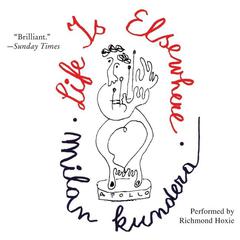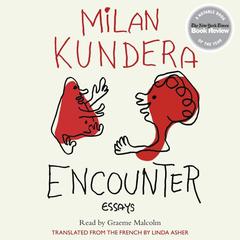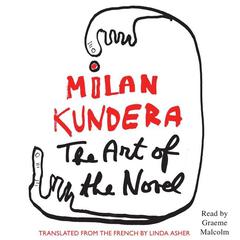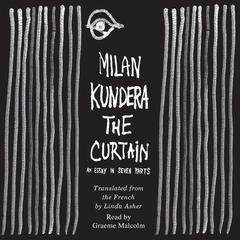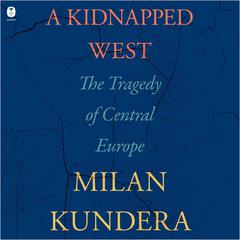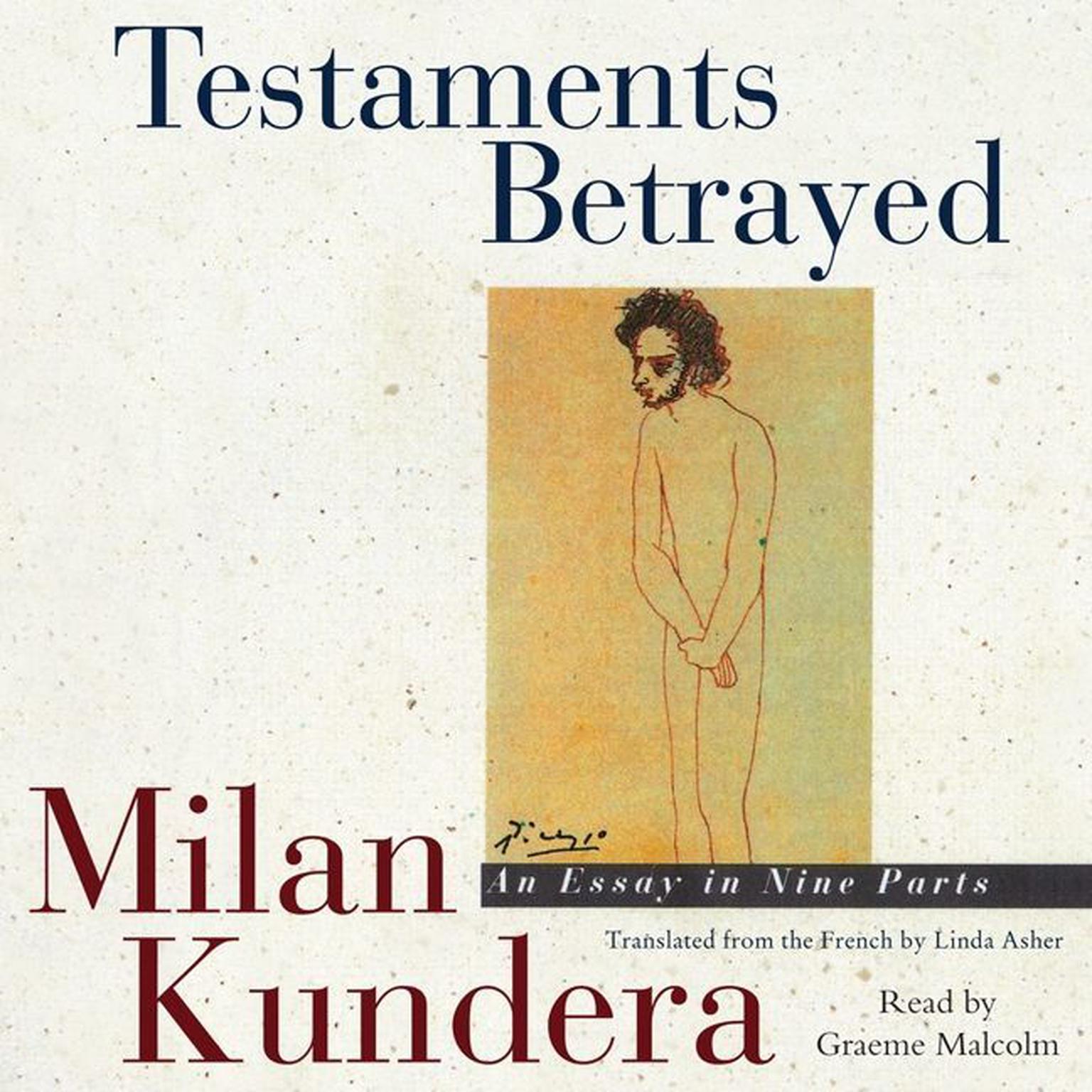 Play Audiobook Sample
Play Audiobook Sample
Testaments Betrayed: An Essay in Nine Parts Audiobook
 Play Audiobook Sample
Play Audiobook Sample
Quick Stats About this Audiobook
Total Audiobook Chapters:
Longest Chapter Length:
Shortest Chapter Length:
Average Chapter Length:
Audiobooks by this Author:
Publisher Description
""A defense of fiction and a lesson in the art of reading."" —New York Times Book Review
""Testaments Betrayed is to be savored paragraph by paragraph. . . . It must be purchased, read, pondered, and argued within the margins. And frequently reread."" — Washington Post
A brilliant and thought-provoking essay from one of the twentieth century’s masters of fiction, Testaments Betrayed is written like a novel: the same characters appear and reappear throughout the nine parts of the book, as do the principal themes that preoccupy the author. Kundera is a passionate defender of the moral rights of the artist and the respect due a work of art and its creator’s wishes. The betrayal of both—often by their most passionate proponents—is one of the key ideas that informs this strikingly original and elegant book.
Download and start listening now!
"Kundera begins with a riff on Rabelais and leads us on a wild tour of European literature from Cervantes to Gombrowicz, with special attention to authors that I love including Musil and Broch. I found this plus his continual focus on the ideas of literature attractive enough; but he essays music as well. There is a wonderful chapter on Janacek and thought-provoking discussion of Stravinsky's place in European music. And with this embedded references to literature, great literature, and his own work, most of which I've yet to read. And did I mention his exceptional essay on Kafka. This is a relatively short book, but one of great depth and breadth. It is simultaneously brilliant music criticism, elegant literary criticism, commentary on the art of writing and translation, and a guide to the great literature of modern Europe. With this book, a loaf of bread and some wine (along with dozens of other texts) one could while away a year or two."
— James (5 out of 5 stars)
Quotes
-
“A fascinating idiosyncratic meditation on the moral necessity of preserving the artist’s work from destructive appraisal…One reads this book to come into contact with one of the most stimulating minds of our era.”
— Boston Globe -
“Effervescent…The excitement of reading Mr. Kundera is that he unpredictably touches down almost everywhere, on rock music and on how characters are defined in fiction, on the nature of Josef K.’s guilt in The Trial and on Chopin’s attraction to shorter forms. Best of all, his sallies lead to fresh readings of such diverse writers as Rabelais, Cervantes, Tolstoy, Mann, Hemingway, Faulkner, Musil, Kafka, and Salman Rushdie.”
— New York Times -
“His insights prove deeper, his connections more daring and profound, the book itself more cohesive as Kundera illuminates in essay after essay the betrayed testaments of music and literature.”
— Seattle Times -
“Kundera once again celebrates the art of the novel, from its birth in a spirit of humor unique to European culture and sensibility—illustrated by some wonderful examples from the work of Rabelais and Cervantes—through its flowering in successive centuries. He celebrates the particular wisdom the novel offers about human existence.”
— Amazon.com, editorial review -
“In this stimulating, free-form essay, Czech novelist Kundera traces the evolution of the novel from Rabelais to Kafka and draws parallels between literature and music as he shuttles effortlessly among Tolstoy, Nietzsche, Chopin, Thomas Mann, Bach, and Andre Breton.”
— Publishers Weekly -
“Kundera, whose talents as a literary and music critic almost match his formidable gifts as a novelist, defends the artist against obtuse or perverse critics, disciples, and allies…Though he offers keen insights into music and literature, it is in his celebration of humor in the European novel that Kundera’s genial brilliance burns most brightly.”
— Booklist -
“Kundera skims along gracefully as a skater, touching several high points—in music and philosophy as much as literature—in a wholly original discussion of how fiction functions and how it is implicated in the fabric of Western culture.”
— Library Journal -
“A wide and engagingly erudite plea for keeping the faith and honoring the wishes of the illustrious dead, rather than insisting on our own self-serving agendas.”
— Kirkus Reviews
Testaments Betrayed Listener Reviews
-
" Intellectual steroids. "
— Mythack, 1/27/2014 -
" KUndera writes as literary critique and in many cases offers alternative interpretations of some classic works. But my impression was that his speculations on novel and interpretations of Kafka or other authors contains criticism of contemporary european culture. I think first part of this book was key to this claim that Europe is headed to becoming an uptight culture where lost sense of humor is going to put an end to the history of the novel. "
— Nutsa, 1/25/2014 -
" less thought out and somewhat disappointing after reading The Curtain... "
— c.vance, 1/20/2014 -
" not his best-some pretty havy chapters on classical music which i shamefully had to skim through.the bits on the art of the novel will interest frustrated writers. "
— Ania, 1/14/2014 -
" Only Kundera could make me cry with an essay about literature, while I was on a plane making its descent into the airport in Berlin. His all-consuming radical understanding of the individual's need for privacy is refreshing given the current personalization of nearly everything. "
— Michalle, 1/14/2014 -
" Definitely the most interesting work of lit crit I've read in a long time. Doesn't feel like you're reading non-fiction. "
— Apoorva, 1/7/2014 -
" Avvolgente. "
— Reallynothing, 12/28/2013 -
" Non-fiction full of brilliant ideas sometimes shadowed by Kundera's ego. Music, writing, all the good things. "
— Avital, 12/5/2013 -
" I wonder, why they have not yet given him a Nobel Prize, while twits have walked away with more... "
— Harish, 12/3/2013 -
" Offensively Eurocentric. "
— Jonasdeleon, 11/5/2013 -
" A great set of essays that takes up the connection between Kundera's theory of the novel and music, philosophy and the arts in a more direct way than The Art of the Novel. "
— Ammon, 9/11/2013 -
" Covers many wonderful topics in literature, music and history. The underlying theme, of how we remember those who we have cared for after they have died, is persuasive. The final image presented is persuasive. "
— JE, 5/5/2013 -
" This was the best book I've read this year. Anyone with the remotest interest in literature and music should read this book. "
— Hüseyin, 12/18/2012
About Milan Kundera
Milan Kundera (1929–2023) was the author of several novels and a short-story collection originally written in Czech, and works of nonfiction originally written in French. His is best know for the novel The Unbearable Lightness of Being, which was adapted for an Oscar-nominated film.
About Graeme Malcolm
Graeme Malcolm was an actor and winning audiobook narrator who earned twelve AudioFile Earphones Awards. He has performed on Broadway as Pharaoh in Aida and as Sir Edward Ramsay in The King and I. His television appearances include Law & Order, Follow the River, and Mr. Halpern and Mr. Johnson (with Laurence Olivier). His film credits include A Further Gesture, The Adventures of Sebastian Cole, and Reunion.











